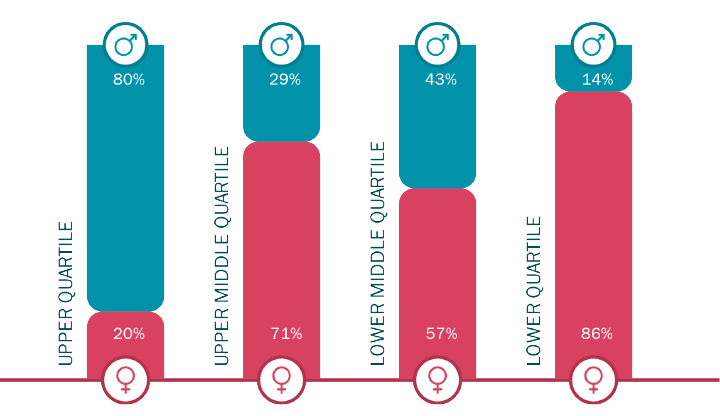Triple Line is committed to increasing the transparency on salary differentials between gender across its operations and within Triple Line pay bands. Importantly, we are also working to understand the reasons behind the pay differences and finding ways to improve equity.
Our gender pay gap report reflects our commitment to improving equality, diversity, and inclusion at Triple Line. We don’t shy away from difficult conversations; we aim to achieve a better gender balance across all bands, which will result in the gender pay gap closing.
Triple Line conducted a baseline survey of our pay by gender across the business and within grades in 2020. Last year, we completed our first full analysis comparing to the baseline, developed a stronger set of actions to address our findings, and shared our findings with all staff. This year we have increased the scope of the review to include new metrics about joiners and leavers, and for the first time are sharing our key findings on our website. Given the limited number of staff in our operations outside of the UK, our analysis is primarily focused on the UK. Next year, as we grow our offices in Africa, we hope to have enough data to draw more meaningful findings from our Addis and Nairobi operations.
2022 Key Findings
- Women make up 57% of our staff in the UK.
- When following the UK government guidance on calculating the gender pay gap, the mean pay of men in our UK operation is 30.5% higher than that of women. This is a significant gap driven by the disproportionately high number of women in more junior positions and a disproportionately low number of women in senior positions.
- Within the salary quartiles, our gender pay gap is much smaller. Women are paid significantly more (+13.5%) on average in the lower quartile, but men are paid 5.8% more on average in the top quartile. The two middle quartiles – where the number of staff by gender is more balanced – showed negligible differences in pay between men and women.
2023 Action Plan
Addressing gender imbalance at the most senior levels - ensuring appropriate support is given to enable female colleagues to progress and carefully considering the barriers to women being recruited into more senior positions - is a top priority. There are no quick fixes to this multi-factorial and complex issue; instead, it requires a greater awareness of the issues, the symptoms, and the causes, and a shift in business practices. Our Plan includes:
Attracting and selecting candidates
- Design recruitment processes that actively avoid bias, for example, blind reviews of tasks.
- Include salary bands in all adverts to improve the number of female applicants (particularly for higher-paid roles, women are more likely to apply if they know the salary range) and to reduce open negotiation, which typically favours men.
- Consider the absolute requirements of the role – wherever possible, offer the greatest level of flexibility to encourage a wide range of applicants, including those returning to work after an absence, those unable to afford to live in the capital city, those with disabilities, and those with caring responsibilities.
- Ensure hiring managers understand their role in diversity and inclusivity and the potential need for reasonable adjustments throughout the hiring process, for example, being flexible on the time of day that interviews are held, giving sufficient notice, and ensuring a balanced interview panel.
- Record and analyse recruitment diversity data to understand how diverse the talent pool is at each stage of the selection process.
Opportunities, rewards and progression
- Continue to discuss and make flexible working arrangements available to staff who request them; strive to enable all staff to maintain a good work-life balance.
- Review our remuneration policy and approach to ensure greater transparency, fairness, and equality.
- Continue to publish our pay grade structure on an annual basis and ensure equity in applying it (e.g. when offering salaries to new hires or during the annual salary review)
- Ensure fairness, consistency and transparency in decision-making around our people processes, such as annual merit, including staff notification of promotions.
- Ensure that there is not unconscious bias in who is considered for promotion or salary increases and that everyone is given good support to develop towards the next level up.
- Provide clarity on what opportunities are available, to whom, and why.
Culture and practices
- Provide diversity and inclusivity training for all, including the process for reporting poor behaviour and the process that will be followed to investigate.
- Be open-minded and think creatively about how jobs could be flexible, such as part-time working and job sharing.
- Promote open discussion about inequalities, how they present themselves, how they can be experienced by different groups, and how we can work together to raise our standards in this area.
- Seek feedback on our diversity and inclusivity approach via an annual survey. Share the outcomes of this survey with all staff.
If you’re interested in talking with us about our gender pay gap, the challenges, and our approach to addressing them, please contact Hannah Swan.





